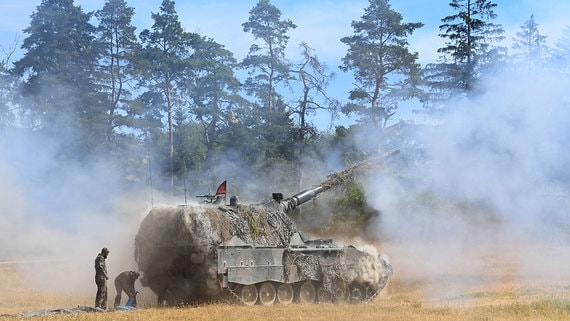Germany lacks money to increase defense spending
[ad_1]

Germany is increasing its defense budget, but the planned spending will not be enough to meet NATO standards for defense spending of 2% of GDP. This is stated in the report of the German Society for Foreign Policy (DGAP), Germany’s leading research organization on foreign policy issues, funded by the government. For Germany, achieving 2% is of fundamental importance after the NATO summit in Vilnius, but this will have to resort to increasing taxes, society experts believe.
According to the DGAP report, in 2024 the German defense budget itself will increase by 1.7 billion euros and amount to 51.8 billion euros. At the same time, Germany’s total defense spending will reach 78 billion euros. In addition to the budget of the Ministry of Defense, this amount will include 19.2 billion euros from the special defense fund and 7 billion euros from the budgets of other ministries and departments. A special fund with a total amount of 100 billion euros was created in 2023 after the start of the SVO for the purchase of weapons for the Bundeswehr until 2026. It was assumed that 40 billion euros would be spent on strengthening the Luftwaffe, including the purchase of new Eurofighter and F-35 fighters, and 19.3 billion euros would be transferred to the needs of the Navy.
These numbers mean that Germany is still aiming to meet the defense spending requirement of 2% of GDP in 2024 and has a financial cushion to do so for 2025 and 2026. But it should be borne in mind that following the results of the Vilnius NATO summit, the requirement of 2% was set not as a goal to strive for, but as a lower acceptable limit. As DGAP experts write, Germany’s credibility as a partner for its allies will continue to be determined by whether it achieves this goal or not. The inability of the Bundeswehr to effectively fulfill its obligations to NATO was previously recognized by the German military themselves. In April 2023, a report was issued by the inspector of the German ground forces, Lieutenant General Alfons Mays. It said that the Bundeswehr could not provide NATO with a division by 2025, as promised earlier, since there were no resources for this even in all the reserves of the German ground forces.
According to the DGAP, by 2026 the financial situation after the special fund is exhausted will become more difficult, as the regular defense budget will remain virtually unchanged and will again fall below 2%. At the same time, already in 2025, arms purchases will not be able to be financed from the regular budget of the Ministry of Defense, but only from a special fund. After its exhaustion, military spending will be directed only to support the activities of the Bundeswehr, without new purchases. Thus, already in 2027, 30 billion euros will not be enough to reach the 2% of GDP target. DGAP sees a way out of this situation in the introduction of new taxes. Without this, the sustained increase in defense spending that Germany needs is impossible.
Since the unification of Germany, the Bundeswehr has suffered from systematic underfunding, said Artem Sokolov, a researcher at the Center for European Studies at MGIMO. Due to the specifics of German policy, the Bundeswehr turned into a peacekeeping army, which for the most part was not engaged in combat missions. The events of 2022 forced Germany to change its approach, but neither an increase in the military budget nor the creation of a 100 billion fund will allow us to achieve the desired defense spending target of 2% of GDP. At the same time, one should not expect decisive measures from German Chancellor Olaf Scholz, such as the introduction of new taxes, according to the expert. Now the ruling coalition is divided, the rating of the government is too low to further provoke the population with unpopular measures. Therefore, the most likely option is that in 2026 the FRG will actually run out of money for additional defense spending. A possible way out is to create a new special fund for the needs of the army, but its funding may be more modest compared to the 100 billion euros allocated earlier. Also, with a very high probability, the ruling coalition will not survive the elections of 2025, so the next government will have to deal with the German defense sphere, sums up Sokolov.
For the Germans, the issue of taxes, given their high level, is of great importance, notes Alexander Kamkin, senior researcher at IMEMO RAS. Still, he believes, Scholz’s coalition may dare to raise taxes to meet NATO standards, given that Germany currently spends only about 1.3% of GDP on defense. The debate about raising taxes will be difficult because of disagreements in the coalition, and if such a measure is approved, its ratings will inevitably fall. Nevertheless, according to the expert, the government can still take such a step.
[ad_2]
Source link








